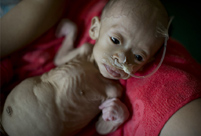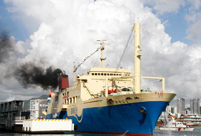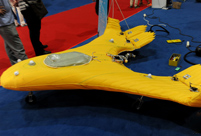 Maritime Silk Road Luxuries of the Han Dynasty
Maritime Silk Road Luxuries of the Han Dynasty
 Ceremony in honor of Confucius held in Sichuan
Ceremony in honor of Confucius held in Sichuan
 Hollywood blockbusters heats up fashion show in NW China
Hollywood blockbusters heats up fashion show in NW China
 Ciao! Chinese beauties!
Ciao! Chinese beauties!
 Naughty polar bear waves to photographer in Wapusk, Canada
Naughty polar bear waves to photographer in Wapusk, Canada
 An eye feast: BFA freshmen registration
An eye feast: BFA freshmen registration
 Top 10 most lavish weddings
Top 10 most lavish weddings
 Most amazing chi-pao beauties
Most amazing chi-pao beauties
 Observe the earth from space
Observe the earth from space
 Chinese lingerie brand arrives in Las Vegas
Chinese lingerie brand arrives in Las Vegas
The first six months of 2014 were not easy for a slowing Chinese economy. For China's steel companies, times were even harder.
Over half of the listed Chinese steel companies saw their debts approach alarming levels in the January-June period, with steelmakers filing their half-year results to stock exchanges by the end of August.
Of all 33 listed steelmakers, 18 firms posted a debt-to-asset ratio higher than 70 percent, with Xinjiang-based Bayi Iron & Steel Co., Ltd. was burdened with the highest debt ratio at 86.46 percent, according to their financial statements.
"For steel companies, a debt-to-asset ratio higher than 70 percent means the firm is facing a capital problem," said Zhang Lin, an analyst with lgmi.com, a steel information service website.
Zhang expected the debt problem to worsen for steel companies as the sector tends to make substantial investments that usually takes a very long period to mature.
Even for the best performing steel companies, the debt-to-asset ratio remained above 60 percent, a level Zhang said underlines the hardship of the entire sector.
China currently has 86 steel companies that produced 411.91 million tonnes of crude steel, 362.02 million tonnes of pig iron and 552.25 million tonnes of rolled steel products in the first half of the year, according to data by the China Iron and Steel Association (CISA).
Total debts of the steel sector exceeded 3 trillion yuan (486 billion U.S. dollars) by the end of June, and 43 percent of the total debts, or 1.3 trillion yuan, stemmed from bank loans, the CISA data showed.
Xu Xiangchun, a steel analyst for Mysteel.com, a steel market portal, said Chinese steelmakers had expanded too fast over the past few years but such expansion is mainly driven by mounting debts borrowed from banks and other financing channels.
As steelmakers owe more, banks are more reluctant to make loans to the sector due to the high debt-to-asset ratio, thus squeezing their liquidity, Xu said.
Early in July, the China Banking Regulatory Commission warned banks to be careful about risks in lending to iron ore dealers, steel companies and other sectors experiencing overcapacity.
The China International Steel Congress last month estimated the country's steel industry now has an excess capacity between 180 million tonnes and 240 million tonnes.
Such overcapacity means steel companies like Bayi Iron & Steel Co., Ltd. must compete with each other with lower prices in order to survive the fierce competition.
Sitting on the highest debt-to-asset ratio, Bayi attributed its loss of 719 million yuan in the first half of the year to weaker demand from the property and infrastructure construction sectors.
"The demand has dwindled greatly and the steel market is flagging," the steel company said in its note to investors.
In the January-June period, Chinese steel companies posted a combined profit of 2.27 billion yuan, reversing a loss of 2.33 billion yuan in the first quarter, according to the CISA data.
But the profit is brought by 4.32 billion yuan in investment revenues and 3.88 billion in non-operating income, rather than their loss-incurring core steelmaking business.
Under such pressure, Xu said, many steelmakers may have to cut or even suspend their production to get through hard times.
"If their money is draining, selling fixed-assets in exchange of operating liquidity is also another option for steel companies, " Xu said.
 Top 10 world's highest-paid models 2014
Top 10 world's highest-paid models 2014 "Twin flowers" bloom in the air
"Twin flowers" bloom in the air The 4th China-Eurasia Expo opens in Urumqi
The 4th China-Eurasia Expo opens in Urumqi Tall girls shine at model competition
Tall girls shine at model competition Girl who cannot gain weight: She is 1, 2.9 kilograms
Girl who cannot gain weight: She is 1, 2.9 kilograms Bazinga! Watch out the 'facekini' fashion bomb attack
Bazinga! Watch out the 'facekini' fashion bomb attack Experiencing maiden voyage between Sanya and Xisha
Experiencing maiden voyage between Sanya and Xisha Chinese inflatable aircraft meets public for the first time
Chinese inflatable aircraft meets public for the first time People enjoy delicacies in Tianjin undersea tunnel
People enjoy delicacies in Tianjin undersea tunnel COMAC jumbo jet and its global rivals
COMAC jumbo jet and its global rivals Capital Spirits: the capital's first liquor bar
Capital Spirits: the capital's first liquor bar Chengdu International Auto Show
Chengdu International Auto Show 2014 int’l drone exhibition
2014 int’l drone exhibition Trainings taken by Chinese navy divers
Trainings taken by Chinese navy divers Female PLA honor guards
Female PLA honor guardsDay|Week|Month